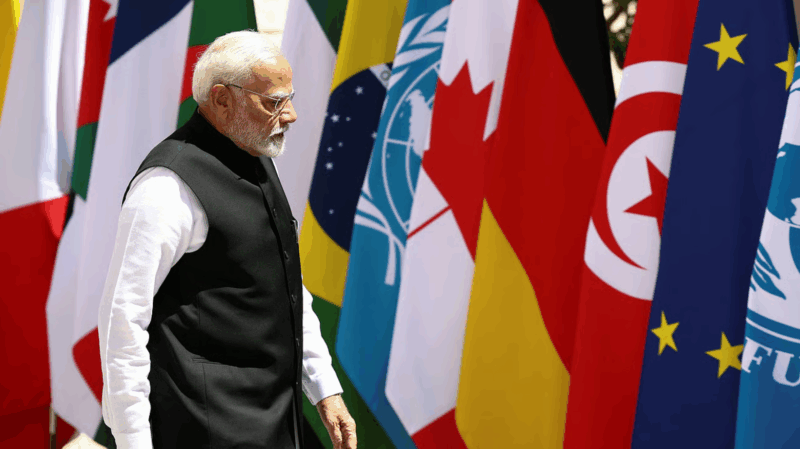India’s non-member role in G7 has evolved significantly over the last few years. It has been invited as a special invitee since 2019.
Prime Minister Narendra Modi will be participating in the G7 summit scheduled to be held in Kananaskis, Alberta, Canada from June 15 to 17. Canadian Prime Minister Mark Carney who invited Modi to the summit – after a delay that was interpreted, initially, as a snub – emphasised India’s stature as one among the top five economies of the world, its key role in global supply chains as well as its relevance to conversations on energy, security and digital infrastructure. “There are certain countries that should be at that table for discussions, and it makes sense that India should be there,” he said.
India’s non-member role in G7 has evolved significantly over the last few years. It has been invited as a special invitee since 2019. The G7 had taken shape in the midst of an oil crisis in 1975 as an informal group for the world’s industrialised nations. Collectively, the grouping represents 45% of the global GDP and 10% of the world’s population. It may be recalled that Modi’s first foreign trip after being re-elected as Prime Minister in 2024 was to a G7 meet in Italy. The forthcoming G7 summit will be Modi’s sixth. India, like the G7 countries, is interested in upholding a rules-based international order and a peaceful resolution of disputes.
The western world needs India on its side to deal with important economic and geopolitical challenges. The summit is expected to address critical issues such as climate change, energy security, challenges posed by Artificial Intelligence, technology inclusivity, and environmental security. China’s rise adds to the concerns, especially its economic and geopolitical assertiveness in the South China Sea and Taiwan. India’s presence in Quad adds to its pivotal role in the Indo-Pacific security framework. Its ability to bring about a consensus on some of these issues is increasingly being recognised.
A part of this recognition has to do with India’s rising economic heft, its strategic location and importance, and its credentials of being a robust democracy. Issues pertaining to the Global South will also be critical to India. India is the fourth largest economy in the world, making it bigger than all the G7 countries put together, without the US and Germany. Prime Minister Modi has also played a significant role in the G7 outreach programmes over the years, particularly highlighting inclusive growth and sustainable development.
There have been calls for reform and greater inclusivity in the G7. India’s participation has been at the Prime Minister’s level which signifies its stature on the global stage, its policy of multi-alignment, autonomy, and a nuanced diplomatic approach. The G7 is also a critical platform for India to voice its perspectives.
India is almost a permanent guest invitee to the G7 summits. It has reached a point where the Indian point of view cannot be ignored. Moreover, the invitation to India is also an indication of the importance of the Global South to the G7 countries. This is primarily because both the US and China have been competing for influence on the Global South. India also comes with credentials of having hosted the G20 summit in 2023.
Mark Carney’s invitation to Prime Minister Modi suggests that India’s presence helps to broaden the G7 dialogue and dispel perceptions that it merely involves considerations of an exclusive club of countries. It underscores New Delhi’s significant role in international diplomacy and economic affairs.
Rebuilding relations
The invitation opens the possibility of mending the India-Canada ties. The relationship reached its nadir during Justin Trudeau’s term as Prime Minister, following allegations of the Indian government’s involvement in the assassination of Khalistani separatist Hardeep Singh Nijjar. Both countries have downgraded diplomatic ties. The summit signals to India the possibility for bilateral engagement, to rebuild its ties with Canada on the basis of mutual trust and sensitivity.
Prime Minister Modi’s role can be that of a bridge between the G7 and the broader international community. India can also help to boost synergies between the G7 and the G20, by playing a pivotal role in shaping resilient and inclusive global economic frameworks. The forthcoming summit will focus on strategies to bolster regional security, address geopolitical/geoeconomic/ geostrategic challenges and promote democratic values. On all these issues, India’s ability to navigate between the eastern and western powers matters.
Source : https://www.deccanherald.com/opinion/what-india-brings-to-g7-table-3581819










